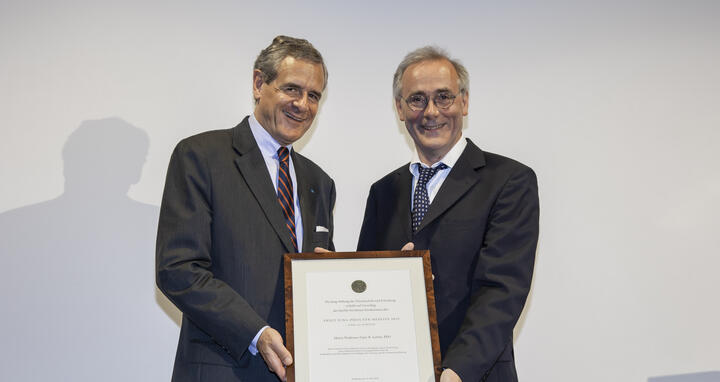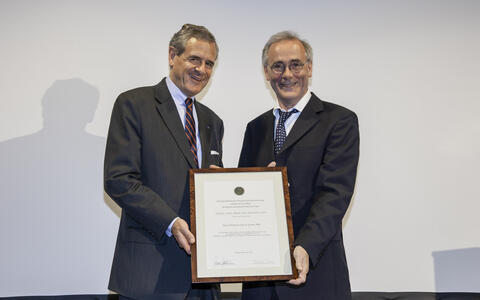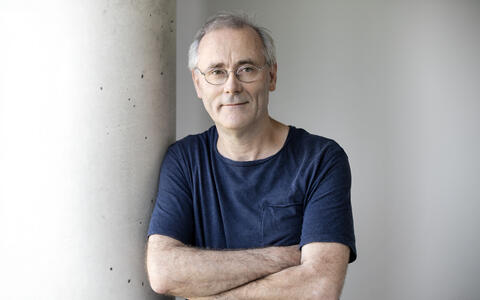Deciphering molecular mechanisms and using them for treatment
Gary Lewin receives Ernst Jung Prize for Medicine
The renowned Ernst Jung Prize for Medicine of the Jung Foundation for Science and Research goes this year to the MDC. The Berlin neurobiologist Professor Dr. Gary R. Lewin from the Max Delbrück Center for Molecular Medicine (MDC) will be honored for his groundbreaking research on the molecular and physiological basis of tactile sense and pain perception. Together with Lewin, the Martinsried-based biochemist Professor Dr. Brenda A. Schulman will be honored. She receives the award in recognition of her groundbreaking work on the mechanisms of ubiquitin transfer at the atomic level.
With their research, both scientists make important contributions to the current state of knowledge in their respective fields. They will share the prize money of 300,000 euros equally. The prize will be awarded today, Thursday, May 23th, in Hamburg.
Thomas Sommer, Scientific Director of the MDC (interim), congratulated both scientists. "I am delighted that Gary Lewin has been awarded this prize. Lewin has been doing groundbreaking research at the MDC for many years. His studies have advanced science on the path to developing therapies against pain," said Sommer. "I am also very happy for Brenda Schulman and congratulate her from the bottom of my heart. She is an excellent colleague with whom I have worked for a long time and whom I greatly appreciate," said Sommer.
Understanding the transmission of stimuli through touch
Gary Lewin
Our skin allows us to perceive touch, pressure, warmth, cold or pain. This happens via sensory cells and free nerve endings, which are located in the skin surface and are responsible for the sense of touch as well as the sense of temperature and pain. Professor Gary R. Lewin, head of the research group and coordinator of the Department of Diseases of the Nervous System at the Max Delbrück Center for Molecular Medicine in Berlin, and his team are investigating how mechanical and thermal stimuli are absorbed by sensory cells and transduced into electrical signals. To this end, the research group is investigating naked mole rats, which serve as model organisms due to their special physiological properties.
Naked mole rats have no coat and are very sensitive to touch. Due to their blindness, these rodents have a particularly strong sense of touch, which they use for social interaction. Lewin was able to show that this species lacks certain types of pain perception. Further investigation of the causes and underlying mechanisms could help to develop new treatments and remedies for pain. “My enthusiasm for research arose during my doctoral thesis when I had the experience of measuring processes that no one had ever measured before,” says Lewin. “When you realise you’ve discovered something important, it’s never just a single result, but many small fragments – experiments, information – that suddenly come together like a puzzle to form a coherent picture. This feeling is indescribable.”
Gary R. Lewin is Manx – born on the Isle of Man – and grew up in Douglas. The 54-year-old is married, has three children and loves going travelling with his family. He is also currently completing his glider pilot’s license.
On the trail of a “ubiquitous” molecule
The molecule ubiquitin serves as an intracellular stop signal and controls what happens in a living cell – just as stop signs regulate traffic on the road. The term “ubiquitin” results from the fact that the molecules occur “ubiquitously” in all eukaryotic cells and control a multitude of different biochemical reactions, from cell division to the defence against bacterial infections. At any given time, each human cell contains thousands of ubiquitin molecules that must be properly placed in different, but specific locations. If their regulation is disturbed, this can lead to diseases such as cancer, neurodegenerative diseases or high blood pressure.
Ubiquitin is an extremely small molecule and can only be seen with extreme magnification, such as under an electron microscope. Professor Brenda A. Schulman, Director of the Department of Molecular Machines and Signalling at the Max Planck Institute for Biochemistry in Martinsried, and her colleagues have developed numerous methods with which the ubiquitin system can be further investigated. They use approaches from chemistry, cell biology, mass spectrometry, biochemistry and structural biology. “I have the feeling that I have been on a treasure hunt for more than 20 years and that I can now finally see the treasure chest from a distance for the first time,” enthuses Brenda A. Schulman. “Thanks to the new methods, we are only now beginning to see the very first wonderful treasures. And since ubiquitin is so omnipresent, there is a whole treasure trove to discover. This is enormously exciting!”
The 51-year-old researcher comes from Tucson, Arizona. She discovered her passion for chemistry and biology and for how molecules perform amazing processes back in the third year of high school. In addition to her research, she regularly runs and enjoys free time with her husband.
About the Prize
The Ernst Jung Prize for Medicine is one of the highest endowed medical awards in Europe and is the foundation’s medical award with the longest tradition. It was issued for the first time in 1976.
The Ernst Jung Prize for Medicine is currently endowed with €300,000 and is awarded to researchers who have contributed considerably to progress in human medicine with their projects and are also expected to do so in future. It honours work in the field of human medicine which is of particularly great clinical significance and may result in new, effective approaches to treatment being implemented in practice.
The laureates of the Ernst Jung Prize for Medicine rank among the top representatives in their discipline. All of them have received other major awards over the course of their careers, including two Nobel Prizes for Medicine.
Further Information
- Jung Foundation for Science and Research
-
-
The Jung Foundation for Science and Research was founded in 1967 by Hamburg-based entrepreneur Ernst Jung and is now run by chairman of the board Jochen Spethmann. The Jung Foundation honours and supports basic research in human medicine and further research with clinical relevance to promote the development of new treatment options. The Ernst Jung Prize for Medicine, the Ernst Jung Gold Medal for Medicine and the Ernst Jung Career Advancement Award for Medical Research rank among the most valuable medical awards throughout Europe with a total of 540,000 Euro.
- Max Delbrück Center for Molecular Medicine
-
-
The Max Delbrück Center for Molecular Medicine in the Helmholtz Association (MDC) was founded in Berlin in 1992. It is named for the German-American physicist Max Delbrück, who was awarded the 1969 Nobel Prize in Physiology and Medicine. The MDC’s mission is to study molecular mechanisms in order to understand the origins of disease and thus be able to diagnose, prevent, and fight it better and more effectively. In these efforts the MDC cooperates with Charité – Universitätsmedizin Berlin and the Berlin Institute of Health (BIH) as well as with national partners such as the German Center for Cardiovascular Research (DZHK) and numerous international research institutions. More than 1,600 staff and guests from nearly 60 countries work at the MDC, just under 1,300 of them in scientific research. The MDC is funded by the German Federal Ministry of Education and Research (90 percent) and the State of Berlin (10 percent), and is a member of the Helmholtz Association of German Research Centers.
Press contact
Jutta Kramm
Head of Communication
Max Delbrück Center for Molecular Medicine (MDC)
Phone: +49(0)30 9406-2121
jutta.kramm@mdc-berlin.de
Anika Nicolaudius
MuthKomm (Jung foundation)
Hopfensack 19
20457 Hamburg
Phone: +49(0)40 307070720
anika.nicolaudius@muthkomm.de








